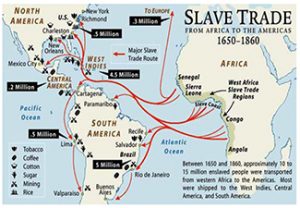
- This event has passed.
Slavery in Early Modern Philosophy
Friday October 23, 2020, 8:45 am - 3:00 pm
Event Navigation

Slavery as an institution has existed in a wide variety of forms. With the transatlantic slave trade, however, the early modern period saw the start of a particularly extensive and brutal form of slavery. During this period, many thinkers – some Black, some white; some canonical philosophers, some less well known – wrote about slavery, but their thoughts on the issue have so far received little scholarly attention. Various historians of philosophy have recently begun to break this significant silence. This symposium aims to contribute to this effort by bringing together some of these scholars for an exchange of ideas.
Schedule
8:45 Words of welcome
9:00-10:15 Julia Jorati, University of Massachusetts Amherst
“Aristotelian Natural Slavery in Early Modern Philosophy”
Talk Abstract
Aristotle claims in the Politics that some human beings are natural slaves and others natural masters. This Aristotelian doctrine plays an important role in early modern discussions about slavery. For instance, some use it to defend the enslavement of Africans and American Indians, others argue against it. This paper focuses on three early modern authors and their attitudes toward Aristotelian natural slavery: Francisco Suárez, Gottfried Wilhelm Leibniz, and Quobna Ottobah Cugoano.
15-minute break
10:30-11:45 Hasana Sharp, McGill University,
“Spinoza and Slavery”
Talk Abstract
This paper outlines the two main senses of slavery in Spinoza’s ethical and political writings. In doing so, I draw inspiration from literature on transatlantic slavery to recast some familiar aspects of Spinoza’s discourse on human bondage. This paper represents the beginning of a project to understand how considerations of the colonial context and Dutch involvement in the transatlantic slave trade might inform our interpretation of Spinoza on servitude.
30-minute break
12:15-1:30 Aaron Garrett, Boston University
“The Duties of a Slave in Early Modern Philosophy”
Talk Abstract
The presentation is in four sections. In the first section I will discuss Cicero’s influence on theories of governance, both in general and regarding servitude or slavery. In the next section I will turn to Grotius’s influential account of servitude which tried to explain how diverse forms of servitude could all be guided by the natural law. Grotius was driven to discuss slaves because slavery was a fact about war and commerce, the objects of his relevant works. In De Jure Belli ac Pacis offered a defense of slavery by explaining when slavery was permissable according to the natural law, when it was not, what sort of treatment of slaves was justified, and what was not. It was Pufendorf though, who I will consider in the next section, who presented slavery as a distinct and unified office of governance in the Ciceronian sense i.e. a moral relation or relations between persons which involved duties to be discharged and reciprocal rights to be exercised. Pufendorf gave servitude unity as a category of moral governance by showing how it entailed distinct rights, restrictions, and duties like other moral categories. In particular Pufendorf made clear that insofar as slavery was a form of mutually beneficial governance slaves had duties. I will conclude by briefly discussing two of Pufendorf’s most important readers: Gershom Carmichael and Frances Hutcheson. Carmichael argued that if Pufendorf’s restrictions were taken seriously then justified governance restricted slavery almost out of existence. Hutcheson took up the obvious conflict in these theories, between all humans as belonging to the cosmopolis and slaves as pushed to the outer limits of governance, and expanded the reasoning of servitude beyond the Ciceronean cosmopolis to the zoopolis and the shepherding of non-human animals.
15-minute break
1:45-3:00 Dalitso Ruwe, New Narratives in the History of Philosophy Post-Doc
“Eighteenth-Century Black Critiques of Political Covenants and Biblical Laws of Slavery”
Talk Abstract
This presentation will focus on how 18th century Black thinkers contested modern conceptions of slavery by formulating new arguments that centered on liberty and resistance to slavery. These arguments often challenged prevailing biblical notions of slavery that slave apologists used to justify the enslavement of Africans.
If you wish to attend this event, please register. After registering, you will receive a confirmation email containing information you will need to join the meeting.
Please note that the symposium will be recorded, and the recording will be available to registered participants.
Contact: Marleen Rozemond
For technical issues: Robbie Matyasi
SHARE
